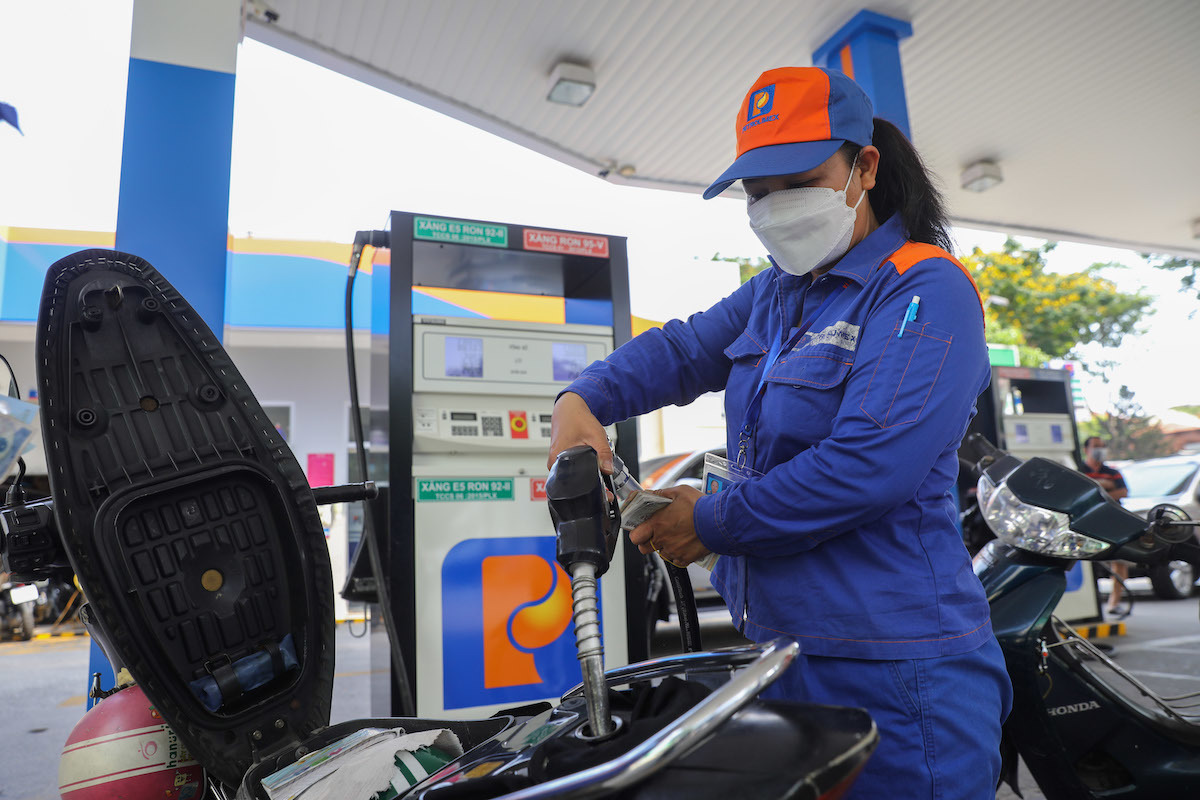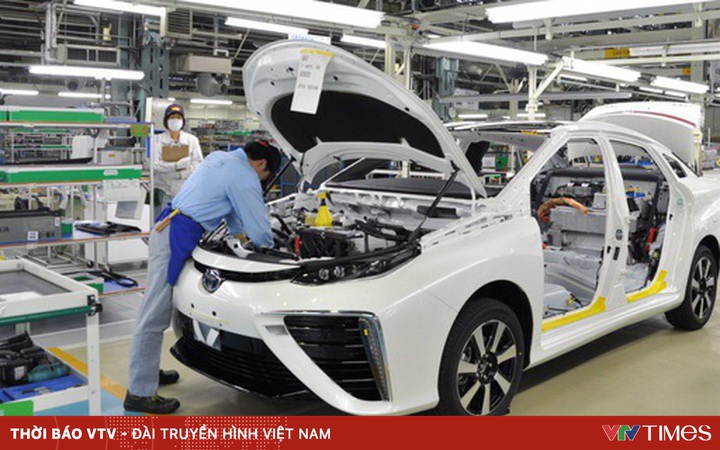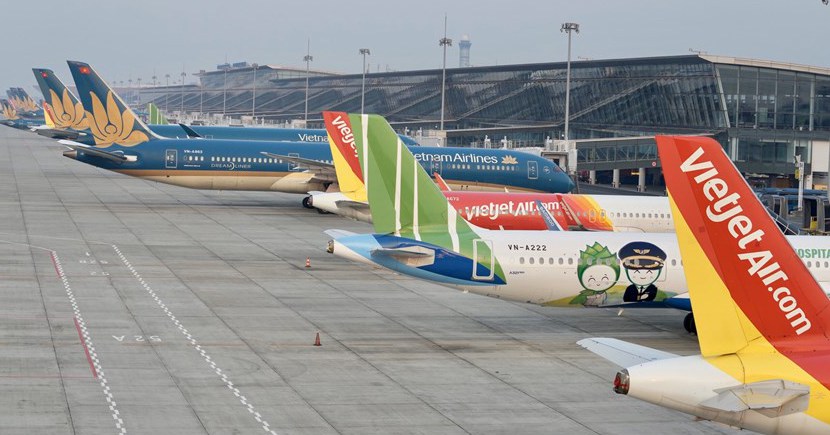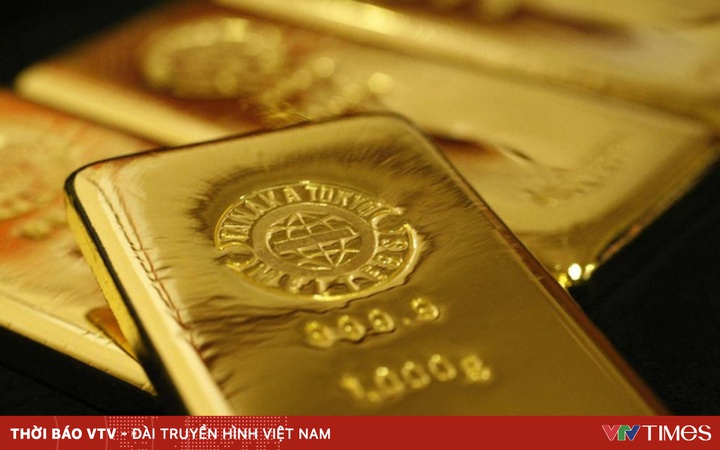“Dear” Nghi Son and the chain of consecutive petrol price increases
Is the world crude oil price the cause of the increase in domestic gasoline prices?
Immediately after the domestic gasoline had a series of strong increases, the public questioned whether the increase in domestic gasoline prices was due to the pressure of crude oil prices in the world and many people found data, the world crude oil price. did not peak like in March (equivalent to 115 – the highest is 130 USD/barrel), Brent oil.
In addition, the environmental protection tax on gasoline has also been reduced by 2,000 VND/liter, which also helps reduce gasoline prices. The stabilization fund also spent a lot of money, but could not stop the sharp increase in gasoline prices.

Domestic gasoline increased 3 times in a row after the latest correction sessions, raising concerns about negative impacts on the economy. Photo: CTV
From the beginning of May to May 12, the price of Brent oil was anchored at 107 USD/barrel to 115 USD/barrel, still not reaching the peak like in March. So, why did the crude oil price not increase, but Petrol prices in the country increased sharply?
Answering this question, the Ministry of Industry and Trade explained, the domestic gasoline price is not based on the world crude oil price, but depends on the price of finished petroleum products through the refining process of petroleum suppliers from other countries. which are mainly from Singapore.
According to the Ministry of Industry and Trade, domestic gasoline prices have been affected by political conflicts between the West and Russia. Meanwhile, in the first quarter, Nghi Son’s petroleum output was still in short supply due to the company’s internal problems.
“Dear” Nghi Son and the internal problems of the petroleum industry
The price of domestic gasoline has increased over the past few days due to external factors. However, the internal problem of the domestic petroleum industry is still the direct cause. It is due to the imbalance between supply and demand, import and export of crude oil and the problem of Nghi Son refinery and petrochemical.
Regarding supply and demand, in order to ensure that Nghi Son’s products are fully consumed in the market, petrol and oil hubs do not have a lot of land to play, and the quantity of imports is limited. It was only when Nghi Son gasoline did not have enough supply and had too many problems, that the Ministry of Industry and Trade urgently assigned 10 imported petroleum hubs, increasing the amount of imports to make up for the shortfall caused by “Dear” Nghi Son. Candlestick.
The second problem is the export and import of crude oil, the problem of benefits and the impact of this policy. According to PVN and the Ministry of Industry and Trade, over the past time, Vietnam has imported quite a lot of crude oil, more than 11 million tons in 2020 and nearly 10 million tons in 2021. Meanwhile, the amount of crude oil exported was also 3.1 million tons.
The amount of crude oil imported is mainly from the Middle East, with low value, serving Nghi Son, a part for Dung Quat for petrochemicals to serve domestic petroleum. Meanwhile, domestic crude oil production is getting less and less due to decreasing reserves and changing strategy. Vietnam’s exported crude oil is mainly sweet oil, with high economic value and efficiency reported and explained by PVN and the Ministry of Industry and Trade.
However, the problem lies in importing crude oil to serve domestic refineries, due to its financial difficulties and balance problems. Nghi Son Refinery and Petrochemical always “calls” for difficulties whenever crude oil in the world increases, PVN has to make up for losses, many times the operation of this plant is put on pause due to economic and efficiency problems. .
Nghi Son Refining and Petrochemical Company Limited (NSRP) is owned by the Vietnam Oil and Gas Group (PVN) with 25.1% of the capital, the International Kuwait Petroleum Company (KPI) holds 35.1%, and the Idemitsu Kosan Company (IKC). holds 35.1% capital and Mitsui Chemical Company (MCI) holds 4.7% capital. Nghi Son Refinery and Petrochemical is built in the plan to supply from 35 to 40% of total petroleum consumption in Vietnam, and products are consumed 100% in Vietnam.
According to the agreement between PVN and investors, PVN will be the off-taker of Nghi Son’s products with the wholesale price at the factory gate equal to the price of imported finished petroleum products, plus an import tax of 7%, and 3% for other petrochemical products (benzene, polypropylene…).
PVN’s commitment for Nghi Son to sell products at world prices, therefore, plus import tax for each unit of petrol, petrol price in Nghi Son is not cheap compared to imported petrol or petrol. sold by Dung Quat.
Nghi Son’s petroleum consumption problem is considered not to create competitive pressure to improve quality and distribution for Nghi Son. Meanwhile, Vietnam is currently implementing tax reduction and exemption on petroleum imports with many major partners, including Korea and ASEAN.
The effect from the product’s off-take policy, while the unstable financial capacity caused the Nghi Son refinery to cut off supply, and the supply crisis caused the domestic petroleum supply to have problems.
According to some experts, the high price of crude oil in the world, Nghi Son called financial difficulties and stopped operating is very difficult to accept because this threatens national energy security. Meanwhile, the Vietnamese government has created many incentives for this business.
In order to ensure supply, businesses are also very careful to import finished petroleum products from abroad because if the market fluctuates or domestic refineries deliver unplanned deliveries, businesses importing gasoline can have great consequences.
at Blogtuan.info – Source: danviet.vn – Read the original article here



